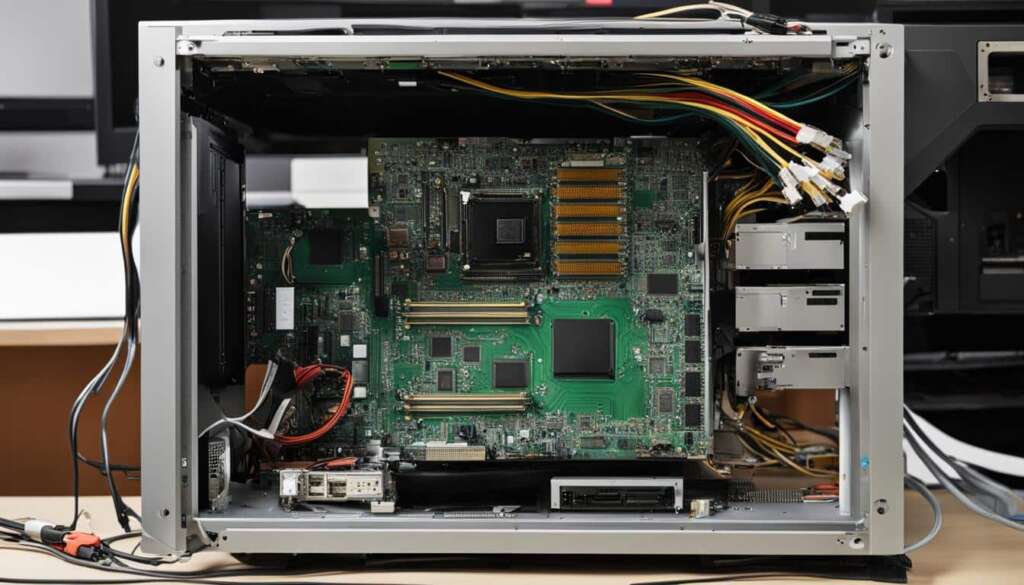Table of Contents
Are you concerned about your online security and want to access blocked content without relying on unreliable free VPN services? Look no further – creating your own VPN server on a PC is the solution you’ve been looking for. By converting a PC into a VPN server, you’ll have complete control over your online privacy and the ability to bypass geo-restrictions. Let’s explore the different methods and software options available to help you create the best VPN hosting for PC.
There are various ways to set up a VPN server on a PC, each with its own advantages and considerations. You can start by purchasing a VPN router that comes with built-in VPN capabilities, making the setup process quick and easy. Alternatively, you can explore advanced firmware options like DD-WRT or Tomato to turn your existing router into a VPN server. If you prefer using another device as a VPN server, such as a smartphone or computer, you can do that too.
For those looking for a comprehensive solution, renting a cloud server from reputable platforms like DigitalOcean, AWS, or Microsoft Azure is an option worth considering. However, if you’re looking for a customizable and user-friendly experience, Amahi – a free home server software – enables you to transform your converted PC into a VPN server with ease. With Amahi, you’ll have full control over your server and enjoy enhanced security for all your digital activities.
Stay tuned as we delve into the different methods and software options in more detail, helping you create the best VPN hosting solution for your PC. Whether you’re a tech enthusiast or a security-conscious individual, developing your own VPN server is an empowering journey that ensures your online activities remain private and unrestricted.
Buying a VPN Router
When it comes to creating a VPN server on your PC, one of the easiest and most convenient options is to purchase a router with built-in VPN capabilities. These high-end routers come equipped with the necessary hardware and software to set up your own VPN server quickly and easily.
By investing in a VPN router, you can ensure that all of your internet traffic is encrypted and secure, protecting your personal information from prying eyes. Additionally, a VPN router allows you to access blocked content and websites, granting you the freedom to browse the internet without restrictions.
However, it is important to choose a router that supports your preferred VPN protocol, such as OpenVPN, to avoid any compatibility issues. Researching and selecting a reliable VPN router from top providers can ensure a seamless and secure VPN hosting experience on your PC.
Table: Top VPN Hosting Providers for PC
| Provider | Features | Price |
|---|---|---|
| ExpressVPN | High-speed servers, strong encryption, global network | $12.95/month |
| NordVPN | Double VPN, strict no-logs policy, 24/7 customer support | $11.95/month |
| Surfshark | Unlimited devices, advanced security features, affordable pricing | $2.49/month |
“Investing in a VPN router can provide you with a hassle-free way to create a VPN server on your PC, ensuring enhanced security and unrestricted internet access.”
By purchasing a VPN router and choosing a reliable provider, you can easily set up and host your own VPN server on your PC. This allows you to enjoy the benefits of a secure and private connection while browsing the internet and accessing blocked content.
Setting Up a VPN Server on Your Router
Another method to create a VPN server on a PC is by replacing your router’s operating system with advanced firmware such as DD-WRT or Tomato. This process, also known as flashing, enables you to host a VPN server directly on your router. However, it requires technical expertise and careful consideration of router compatibility. Mistakes during the flashing process can lead to router malfunctions or “bricking.” Therefore, careful research and following specified instructions are crucial for success.
Flashing your router with DD-WRT or Tomato firmware unlocks a range of benefits. These firmware options provide a user-friendly interface and advanced features to optimize your VPN connection. They also offer greater control over your network settings, allowing you to customize your VPN server and ensure reliable and secure performance.
Before you start the flashing process, ensure that your router is compatible with the selected firmware. Check the DD-WRT or Tomato websites for a list of compatible routers. Once you have confirmed compatibility, follow the step-by-step instructions provided by the firmware’s official documentation. It is essential to follow the instructions carefully, as any errors can result in irreversible damage to your router.
Comparison of DD-WRT and Tomato Firmware for VPN Hosting on PC
| DD-WRT | Tomato | |
|---|---|---|
| Customization | Extensive customization options for advanced users | Simpler interface with fewer customization options |
| Compatibility | Supports a wide range of routers | Supports a limited number of routers |
| VPN Protocols | Supports multiple VPN protocols, including OpenVPN | Primarily supports OpenVPN |
| Security Features | Advanced security features like VPN kill switch and VLAN support | Basic security features |
| Stability | May have stability issues with certain routers | Generally stable performance |
Flashing your router with advanced firmware like DD-WRT or Tomato can unlock the full potential of your VPN server. However, it is important to note that flashing your router may void its warranty. Additionally, if not done correctly, it can lead to permanent damage to your router. Therefore, proceed with caution and ensure that you are comfortable with the flashing process before attempting it.
Once you have successfully flashed your router and set up your VPN server, you can enjoy the benefits of hosting a VPN directly on your router. This allows all devices connected to your network to benefit from the VPN’s security and privacy features without the need to install VPN software individually. It also simplifies the management of your VPN connection, as the VPN server is always active on your router.
Using Another Device as a VPN Server
If your router is not compatible with OpenVPN or you prefer a different approach, you can utilize another device, like a smartphone or computer, as a VPN server. This method allows flexibility and is suitable for those who keep the chosen device running at all times. However, it requires setting up port forwarding on your router to enable access to the VPN server from the internet. Additionally, specific instructions for each operating system must be followed to ensure a secure and reliable VPN connection.
Using another device as a VPN server offers several advantages. Firstly, it allows you to repurpose existing devices, saving you the cost of purchasing additional hardware. Secondly, it provides greater control over your VPN server as you can customize the software and settings based on your specific requirements. Finally, using another device as a VPN server ensures that your main PC is not tied up solely as a server, allowing you to use it for other tasks simultaneously.
When using another device as a VPN server, it is essential to choose a device that meets the necessary system requirements and has a stable internet connection. Additionally, ensure that the device remains powered on and connected to the internet for uninterrupted VPN access. Following the specific instructions for your operating system, whether it’s Windows, macOS, or Linux, will ensure that you establish a secure and reliable VPN connection for your PC.
Benefits of Using Another Device as a VPN Server:
- Cost-effective: Repurpose existing devices to create a VPN server without the need for additional hardware.
- Greater control: Customize the software and settings of the device-based VPN server according to your specific requirements.
- Multi-tasking: Free up your main PC for other tasks while utilizing another device as a dedicated VPN server.
Considerations for Using Another Device as a VPN Server:
- System requirements: Ensure that the chosen device meets the necessary specifications to function as a VPN server.
- Stable internet connection: Maintain a reliable internet connection on the device to ensure uninterrupted VPN access.
- Operating system compatibility: Follow the specific instructions for your operating system to establish a secure VPN connection.
Using Home Server Software – Amahi
When it comes to creating a personal VPN server on a converted PC, Amahi is a reliable and secure home server software option. Based on Fedora Linux, Amahi offers a range of features, including the ability to create a VPN server. With Amahi, you can have full control over your VPN server and enjoy enhanced security for your digital activities.
Amahi is highly customizable and easy to install, making it a suitable choice for users who want their PC to function as a VPN server along with other functionalities like NAS (Network Attached Storage) and media streaming.
Installing Amahi is a straightforward process. Simply ensure that your PC meets the minimum system requirements and download the Amahi installation media from the official website. You can then create a bootable USB drive or burn the ISO file to a DVD. Once you boot from the installation media, you’ll be prompted to enter your Amahi Install Code, which links your server to your Amahi account.

Amahi Installation Steps:
- Check system requirements
- Download Amahi installation media
- Create bootable USB drive or burn ISO to DVD
- Boot from the installation media
- Enter the Amahi Install Code
Once the installation is complete and your server reboots, you can access your Amahi server through its dashboard from any other computer on your network. From there, you can start setting up shared folders and drives to organize your files and enable access from other devices on your network.
In summary, Amahi is a secure and reliable home server software that allows you to create a VPN server on a converted PC. With its user-friendly interface and customizable features, it’s an excellent choice for those looking to enhance their security and privacy while enjoying the benefits of a personal VPN server.
Installing Amahi
VPN Hosting on PC, VPN Hosting solutions for PC, and secure VPN Hosting for PC are essential for individuals who prioritize online security and unrestricted access to content. To install Amahi and create a personal VPN server on your PC, follow these steps:
Step 1: Check System Requirements
Before proceeding with the installation, ensure that your PC meets the minimum system requirements specified by Amahi. This information can be found on the official Amahi website. It is crucial to have a compatible PC to ensure smooth operation and optimal performance of your VPN server.
Step 2: Download and Prepare Installation Media
Visit the Amahi website and download the Amahi installation media in the form of an ISO file. Burn the ISO file to a DVD or create a bootable USB drive using appropriate software. This step will enable you to boot from the installation media and initiate the installation process.
Step 3: Install Amahi
Insert the DVD or connect the bootable USB drive to your PC and restart it. Make sure your PC is set to boot from the installation media. The Amahi installation wizard will guide you through the installation process. Follow the on-screen instructions, including accepting the license agreement, selecting your language and keyboard settings, and choosing the installation location.
During the installation, you will be prompted to enter your Amahi Install Code. This code links your server to your Amahi account, allowing access to the centralized web services provided by Amahi. Keep this code secure and readily accessible.
Step 4: Accessing Your Amahi Server
Once the installation is complete and your PC reboots, you can access your Amahi server through its dashboard. From another computer on your network, open a web browser and enter the IP address of your Amahi server. This will take you to the Amahi dashboard, where you can configure your VPN server and manage other server functionalities.

By following these steps, you can successfully install Amahi and create a personal VPN server on your PC. Amahi offers a user-friendly interface and comprehensive features that make it a secure and reliable VPN Hosting solution for PC users.
Once you have successfully installed Amahi on your PC, you can begin setting up shared folders and drives to streamline your file organization and improve accessibility. Shared folders allow you to store and access files from multiple devices on your network, making it easy to share documents, photos, videos, and other important files between your devices.
By default, Amahi creates several shared folders, including books, movies, music, and pictures. These folders are accessible to all users on your network, ensuring easy collaboration and file sharing. However, you can customize the access permissions for each folder to restrict or grant access to specific users. This level of fine-tuning allows you to maintain control over your data and ensure privacy.
In addition to the default shared folders, you can also create your own custom shared folders tailored to your specific needs. Whether you need a folder for work-related documents, personal projects, or family photos, Amahi provides the flexibility to create as many shared folders as you require.
To create a shared folder in Amahi, follow these simple steps:
- Log in to your Amahi server’s dashboard.
- Navigate to the “Shares” section.
- Click on the “Add” button to create a new shared folder.
- Enter a descriptive name for the folder.
- Choose the desired access permissions for the folder (e.g., read-only, read-write).
- Select the users or groups who should have access to the folder.
- Click “Save” to create the shared folder.
Once you have created your shared folders, you can easily access them from any device on your network. Simply navigate to the network location of your Amahi server and browse through the shared folders to find the files you need. This seamless integration makes it effortless to collaborate, share, and access your files wherever you are.
| Shared Folder | Description |
|---|---|
| Books | Store and access your e-books, PDFs, and other reading materials. |
| Movies | Organize and stream your movie collection to media devices. |
| Music | Centralize your music library and listen to your favorite tunes from any device. |
| Pictures | Store and showcase your memorable photos and images. |
| Work | Create a designated folder for work-related documents and projects. |
Three Cool Things You Can Do With Your New Amahi Server
Once you have set up your Amahi server and transformed your PC into a powerful VPN hosting solution, you can explore its additional features and functionalities to enhance your digital experience. Here are three cool things you can do with your new Amahi server:
1. Media Streaming
With Amahi, you can transform your server into a media streamer and enjoy seamless streaming of your favorite movies, TV shows, and music to your mobile devices. Whether you’re at home or on the go, you can access your media library and enjoy your content without any limitations. Amahi supports popular media streaming applications like Plex, Emby, and Subsonic, allowing you to create your own personalized media streaming platform.
2. Personal VPN
One of the key features of Amahi is its ability to function as a personal VPN server, providing secure remote access to your home network. This means you can connect to your home network and access your files, printers, and other devices while on the go or working remotely. With the built-in VPN functionality of Amahi, you can protect your data and ensure your online activities remain private, even when using unsecured networks.
3. File Sharing
Amahi offers robust file sharing capabilities, allowing you to access your files on your phone or tablet. You can easily upload and download files, create shared folders for collaboration with friends or colleagues, and even set up remote access to your files from anywhere in the world. Whether you need to share documents, photos, or videos, Amahi makes it easy and secure to manage your files and collaborate with others.
By leveraging these three cool features, you can maximize the potential of your new Amahi server and create a comprehensive digital ecosystem tailored to your needs. Whether you’re a media enthusiast, a remote worker, or someone who values secure and convenient file access, Amahi has you covered.
Creating a VPN Server on Windows
Windows operating systems offer built-in functionality to function as a VPN server using the PPTP (Point-to-Point Tunneling Protocol). This allows you to create a VPN server directly on your PC. However, it is important to note that this method requires port forwarding and exposing your PC and a port for the VPN server to the internet, which poses security risks. Creating a VPN server on Windows may not be the ideal choice for everyone, especially for those who prefer a more comprehensive software package dedicated to VPN functionalities.
While setting up a VPN server on Windows is relatively straightforward, it lacks some of the advanced features and security measures provided by dedicated VPN hosting software. Windows’ built-in VPN server mainly supports PPTP, which is generally considered less secure than other protocols like OpenVPN. Additionally, the built-in VPN server may have limited customization options and may not offer features such as DNS leak protection, kill switch, or multi-factor authentication.
If you are looking for a more comprehensive VPN hosting solution for your PC, it is recommended to consider dedicated VPN hosting software. These software packages provide a wide range of features and protocols, ensuring better security, customization, and performance for your VPN server. Popular VPN hosting software options include OpenVPN, SoftEther, and WireGuard, each offering its unique set of features and capabilities.

| Method | Pros | Cons |
|---|---|---|
| Windows Built-in VPN Server |
|
|
| Dedicated VPN Hosting Software |
|
|
Conclusion
Creating a personal VPN server on your PC is an excellent way to ensure enhanced security and unrestricted access to online content. Whether you decide to purchase a VPN router or utilize advanced firmware, careful consideration of compatibility and technical expertise is vital. Additionally, the option to use another device as a VPN server provides flexibility for those who prefer a different approach.
Amahi stands out as a user-friendly and customizable home server software option, offering a comprehensive solution for VPN hosting on your PC. With its wide range of features and ease of installation, Amahi empowers you to take control of your VPN server while enjoying other functionalities like NAS and media streaming.
For Windows users, the built-in functionality to create a VPN server may seem convenient, but it’s important to note that it may not offer the same level of security and comprehensive features as dedicated software packages. Therefore, careful consideration of your specific needs and requirements is crucial.
In conclusion, when it comes to VPN hosting on your PC, finding the best solution for your needs is key. Whether you choose an off-the-shelf VPN router, opt for advanced firmware, or utilize software like Amahi, prioritizing security and reliable access to blocked content should guide your decision-making process. Protect your online activities and enjoy the freedom of a secure VPN hosting experience on your PC.
FAQ
What is a VPN server?
A VPN server is a remote server that encrypts your internet connection and allows you to browse the web securely and access blocked content.
Why should I create my own VPN server?
Creating your own VPN server gives you more control over your privacy and security compared to relying on free VPN services that may be unreliable or insecure.
How can I create a VPN server on a PC?
There are several methods to create a VPN server on a PC, including buying a VPN router, setting up a VPN server on your existing router, using another device as a VPN server, or utilizing home server software like Amahi.
What is a VPN router?
A VPN router is a router that comes with built-in VPN capabilities, allowing you to easily set up your own VPN server.
What is firmware flashing?
Firmware flashing is the process of replacing a router’s operating system with advanced firmware, like DD-WRT or Tomato, to enable hosting a VPN server directly on the router.
Can I use a smartphone or computer as a VPN server?
Yes, you can utilize another device, such as a smartphone or computer, as a VPN server. However, you will need to set up port forwarding on your router for access from the internet.
What is Amahi?
Amahi is a free, open-source home server software based on Fedora Linux. It allows you to create a VPN server on a converted PC, along with other functionalities like NAS and media streaming.
How do I install Amahi?
To install Amahi, you need a PC that meets the minimum system requirements and the Amahi installation media. After burning the ISO file to a DVD or creating a bootable USB drive, you can boot from it to initiate the installation process.
Yes, Amahi allows you to set up shared folders and drives to organize your files and enable access from other devices on your network.
What additional features does Amahi offer?
Amahi offers various add-ons and applications that enhance the functionality of your server, including media streaming, personal VPN, and file sharing capabilities.
Can I create a VPN server on Windows?
Yes, Windows operating systems offer built-in functionality to function as a VPN server using the PPTP protocol. However, this method requires port forwarding and has security risks.













